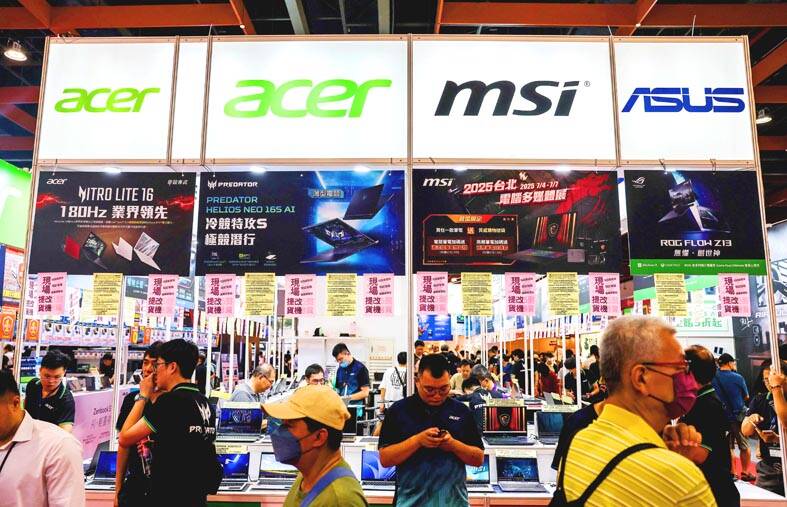Asustek Computer Inc’s (華碩) PC shipments increased 8.6 percent year-on-year to 4.49 million units in the second quarter, driven by US tariff-related inventory buildup and desktop system upgrades, market researcher Gartner Inc said in a report on Monday.
The company secured a 7.1 percent share of the global market in the second quarter, ranking fifth place ahead of Acer Inc (宏碁), but trailing behind Lenovo Group Ltd (聯想), HP Inc, Dell Technologies Inc and Apple Inc, Gartner said.
Among the top five, only Dell saw a decline in shipments in the second quarter, down 3 percent year-on-year to 9.83 million units, the researcher said.

Photo: I-Hwa Cheng, AFP
Overall, global PC shipments rose 4.43 percent to 63.23 million units in the second quarter, from 60.54 million units a year earlier, it said.
The figure also grew 7.26 percent from the previous quarter.
The growth in global PC shipments in the second quarter was mostly driven by enterprise demand due to the upcoming end of service for Microsoft Corp’s Windows 10 operating system and a post-COVID-19 upgrade cycle, Gartner said.
In contrast, consumer refreshes slowed in the quarter, and many organizations chose to upgrade existing devices rather than purchase new ones with Windows 11, it said.
By region, shipments to North America dipped 0.5 percent year-on-year, while those to the Asia-Pacific market remained flat. Shipments to Europe, the Middle East and Africa rose 5.3 percent, reflecting stronger-than-usual seasonal demand.
Global PC shipments in the second half are likely to remain flat, as vendors have front-loaded inventory to meet demand, potentially leading to excess stock by the end of this year, Gartner research principal Rishi Padhi said in a statement.
Full-year shipments are expected to grow 2.4 percent this year from last year, driven by front-loaded inventory in the US in the first half and replacement demand stemming from the Windows 11 upgrade cycle, Gartner said.
Asustek in May said it began stockpiling PC and notebook inventory equivalent to three to six months of supply in the fourth quarter of last year.
Acer earlier this month said it had not front-loaded inventory for the US market in response to potential high US tariffs, with its inventory levels remaining normal at six to eight weeks.
Last week, International Data Corp (IDC) reported a slowdown in US PC demand in the second quarter due to tariff-related uncertainty, adding that PC vendors’ US sales could slow this quarter amid inventory buildup.
“Price increases will likely be dispersed over time and geography depending on vendor strategy, which can potentially lead to some attractive promotions as a way to clear inventory backups,” IDC worldwide device tracker group vice president Ryan Reith said in a statement.

In Italy’s storied gold-making hubs, jewelers are reworking their designs to trim gold content as they race to blunt the effect of record prices and appeal to shoppers watching their budgets. Gold prices hit a record high on Thursday, surging near US$5,600 an ounce, more than double a year ago as geopolitical concerns and jitters over trade pushed investors toward the safe-haven asset. The rally is putting undue pressure on small artisans as they face mounting demands from customers, including international brands, to produce cheaper items, from signature pieces to wedding rings, according to interviews with four independent jewelers in Italy’s main

Japanese Prime Minister Sanae Takaichi has talked up the benefits of a weaker yen in a campaign speech, adopting a tone at odds with her finance ministry, which has refused to rule out any options to counter excessive foreign exchange volatility. Takaichi later softened her stance, saying she did not have a preference for the yen’s direction. “People say the weak yen is bad right now, but for export industries, it’s a major opportunity,” Takaichi said on Saturday at a rally for Liberal Democratic Party candidate Daishiro Yamagiwa in Kanagawa Prefecture ahead of a snap election on Sunday. “Whether it’s selling food or

CONCERNS: Tech companies investing in AI businesses that purchase their products have raised questions among investors that they are artificially propping up demand Nvidia Corp chief executive officer Jensen Huang (黃仁勳) on Saturday said that the company would be participating in OpenAI’s latest funding round, describing it as potentially “the largest investment we’ve ever made.” “We will invest a great deal of money,” Huang told reporters while visiting Taipei. “I believe in OpenAI. The work that they do is incredible. They’re one of the most consequential companies of our time.” Huang did not say exactly how much Nvidia might contribute, but described the investment as “huge.” “Let Sam announce how much he’s going to raise — it’s for him to decide,” Huang said, referring to OpenAI

The global server market is expected to grow 12.8 percent annually this year, with artificial intelligence (AI) servers projected to account for 16.5 percent, driven by continued investment in AI infrastructure by major cloud service providers (CSPs), market researcher TrendForce Corp (集邦科技) said yesterday. Global AI server shipments this year are expected to increase 28 percent year-on-year to more than 2.7 million units, driven by sustained demand from CSPs and government sovereign cloud projects, TrendForce analyst Frank Kung (龔明德) told the Taipei Times. Demand for GPU-based AI servers, including Nvidia Corp’s GB and Vera Rubin rack systems, is expected to remain high,